Undoing Racism in New Brunswick, Cincinnati, & The Episcopal Diocese of NJ
February 1, 2013
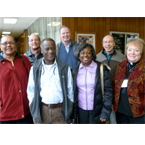 “Racism in 2013? A two-term black president leads our country. Surely we have overcome,” intones Dr. Will Ashley, the distinguished black associate professor and lifelong pastor who is Acting Dean of the Seminary. Dean Ashley opened our 2.5-day antiracism workshop describing how attempts to discuss racism can be met with surprise and denial. Workshop participants described their own conversations: Painful. Superficial. Angry. Rewarding.
“Racism in 2013? A two-term black president leads our country. Surely we have overcome,” intones Dr. Will Ashley, the distinguished black associate professor and lifelong pastor who is Acting Dean of the Seminary. Dean Ashley opened our 2.5-day antiracism workshop describing how attempts to discuss racism can be met with surprise and denial. Workshop participants described their own conversations: Painful. Superficial. Angry. Rewarding.
 NBTS is one of the only seminaries to require antiracism training. Dismantling racism at the Seminary is a continuous process. For this January-term workshop, students, faculty and staff were joined by healthcare and social work professionals at UMDNJ, University of Cincinnati professors and the Anti-Racism Team of the Episcopal Diocese of NJ.
NBTS is one of the only seminaries to require antiracism training. Dismantling racism at the Seminary is a continuous process. For this January-term workshop, students, faculty and staff were joined by healthcare and social work professionals at UMDNJ, University of Cincinnati professors and the Anti-Racism Team of the Episcopal Diocese of NJ.Dean Ashley retold the story of the 2005 graduate student who had the audacity to write a paper about systemic racism at the Seminary, the professor who encouraged him to organize among students, and the landmark Board resolution that resulted from their efforts (see full text below).* “The Board invited our organization to investigate how we are complicit in our system and power imbalances; and then to engage in ‘Difficult Conversations” to dismantle them.”
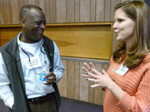 The Seminary requires all faculty and staff to participate in the training, as recommended by the Anti-Racism Transformation Team. Seminary students attended as part of a 2-credit course. And nurses, social workers, psychologists and counselors at UMDNJ attended to meet cultural competency requirements.
The Seminary requires all faculty and staff to participate in the training, as recommended by the Anti-Racism Transformation Team. Seminary students attended as part of a 2-credit course. And nurses, social workers, psychologists and counselors at UMDNJ attended to meet cultural competency requirements.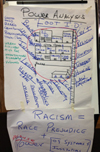 Scrapping traditional binders, this year’s facilitators of Undoing Racism from the People’s Institute for Survival and Beyond honed in on the shared experience in the room. Motioning to the 46 chairs that circled Hertzog Hall, facilitator Rev. Joe Barndt, a Lutheran pastor with 40 years experience dismantling institutional racism, explained. “This is the text right here.” The process worked through the dynamics of personal and institutional racism and how it adversely affects all of us, every day. Facilitator Rev. Tyronne emphasized that racism destroys everyone, “We are all damaged goods.”
Scrapping traditional binders, this year’s facilitators of Undoing Racism from the People’s Institute for Survival and Beyond honed in on the shared experience in the room. Motioning to the 46 chairs that circled Hertzog Hall, facilitator Rev. Joe Barndt, a Lutheran pastor with 40 years experience dismantling institutional racism, explained. “This is the text right here.” The process worked through the dynamics of personal and institutional racism and how it adversely affects all of us, every day. Facilitator Rev. Tyronne emphasized that racism destroys everyone, “We are all damaged goods.”“To understand racism, you have to first understand a person’s culture-where they are coming from,” explains Yasha People, executive assistant to the Seminary’s president. “This really came through in the workshop because we had a culturally diverse group of people.” Secular versus faith-based, Mid-West versus East Coast. “We had to share our different experiences of racism before we could talk about how we are the same.”
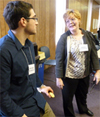 Dianna Grievenkamp, an educator at the University of Cincinnati, explains why her team flew to New Jersey. “Our students come to us totally unprepared,” she explains. “They tell us they don’t talk about race because they are afraid.” A large number are young white women from middle-class suburbs. Cincinnati alone is a cultural shock for them. “The stakes are very high–they worry about making a terrible mistake, offending someone so badly that they could be fired. Our job is to describe in a very detailed way how to talk responsibly about race and all its related issues.”
Dianna Grievenkamp, an educator at the University of Cincinnati, explains why her team flew to New Jersey. “Our students come to us totally unprepared,” she explains. “They tell us they don’t talk about race because they are afraid.” A large number are young white women from middle-class suburbs. Cincinnati alone is a cultural shock for them. “The stakes are very high–they worry about making a terrible mistake, offending someone so badly that they could be fired. Our job is to describe in a very detailed way how to talk responsibly about race and all its related issues.”
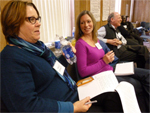 Michael De Nichilo, a graduate social work student at Rutgers-Newark, served as a social worker at his field placement in an alternative education school in Union City. “This training really drove home to me that I can only advocate on behalf of my students when I paint a very detailed picture.” It’s not enough to talk about socio-economic statistics, people just tune that out. “When my student goes home, he can’t do his homework because his electricity is shut off. He has no heat and so he cannot sleep, that’s why he can’t take advantage of what we offer at school.” That’s the story that will change the dynamics in the long run.
Michael De Nichilo, a graduate social work student at Rutgers-Newark, served as a social worker at his field placement in an alternative education school in Union City. “This training really drove home to me that I can only advocate on behalf of my students when I paint a very detailed picture.” It’s not enough to talk about socio-economic statistics, people just tune that out. “When my student goes home, he can’t do his homework because his electricity is shut off. He has no heat and so he cannot sleep, that’s why he can’t take advantage of what we offer at school.” That’s the story that will change the dynamics in the long run.
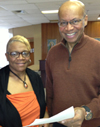 * Resolution of the Board of Trustees. We, the Board of Trustees of New Brunswick Theological Seminary, have decided to take a stand against racism and the insidious structures of privilege and power. We are committed to identifying and dismantling all such structures in this Seminary. We make this commitment in full knowledge and understanding that it will involve uncomfortable and painful self-examination, both personal and corporate, and that it will require deep and difficult changes at all levels of our beloved institution, including this board. We are humbly yet firmly convinced that in making this commitment we are being led by the Spirit, we are demonstrating obedience to God’s will and plan, and we are following the example of Jesus, Our Lord and Savior. We pray that God our Creator, Redeemer and Sustainer will redeem our sins and guide, bless and help our creative efforts to let God do a “new thing” at New Brunswick Theological Seminary.
* Resolution of the Board of Trustees. We, the Board of Trustees of New Brunswick Theological Seminary, have decided to take a stand against racism and the insidious structures of privilege and power. We are committed to identifying and dismantling all such structures in this Seminary. We make this commitment in full knowledge and understanding that it will involve uncomfortable and painful self-examination, both personal and corporate, and that it will require deep and difficult changes at all levels of our beloved institution, including this board. We are humbly yet firmly convinced that in making this commitment we are being led by the Spirit, we are demonstrating obedience to God’s will and plan, and we are following the example of Jesus, Our Lord and Savior. We pray that God our Creator, Redeemer and Sustainer will redeem our sins and guide, bless and help our creative efforts to let God do a “new thing” at New Brunswick Theological Seminary.
